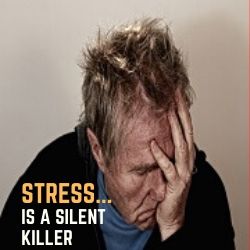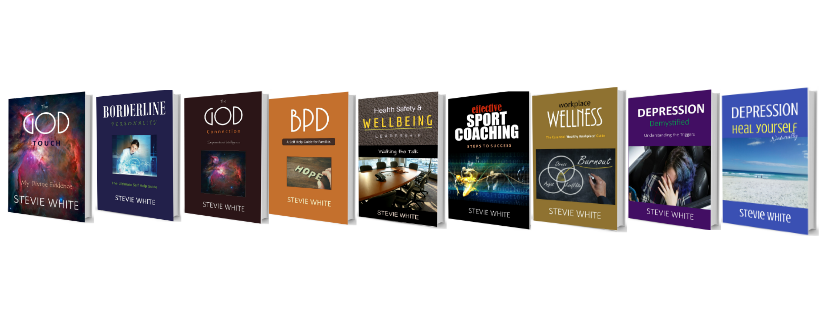Stress is a Silent Killer

Stress is often described as a silent killer, because it has many faces, and can enter your life from many directions and for different reasons. Yet, no matter what it causing it to happen - your mind, body and spirit can become adversely affected, if you allow yourself to enter a distressed state of mind.
Besides, the fact that your body can become flood with damaging stress hormones; your heart can pound faster; your stomach may churn, and your breathing can become erratic. Sadly, millions of people can be going about their normal everyday life without even realizing what they’re feeling, or why they are falling into a distressed state of mind. But what is stress?
Stress Defined
I found it hard to pin down one specific and trusted definition of ‘Stress’ as it is being defined in many ways by various global institutions or experts. In saying that, there does appear to be some commonly occurring key words that may help define it.
For instance, words such as ‘pressure’, ‘tension’, ‘demands’, ‘strain’, ‘disturbance’, ‘imbalance’, ‘overwhelmed’, ‘coping’ appear often. There has been a lot of research groundwork done about stress, which raises the question – who should you trust when it comes to defining it or trusting its meaning?
A widely known and credible research source on the global map is the ‘American Psychological Association’ (APA). The APA definition of stress is as follows.
"Any uncomfortable emotional experience accompanied by predictable biochemical, physiological and behavioral changes.”
I see no point in looking beyond a leading global expert on the subject,
in ‘Hans Selye’ – as, he has conducted many in-depth studies associated
with the subject of human stress, and how it impacts the body from a
medical point of view. So, if you’re more than concerned about stress,
then I would encourage
you to seek out his books on the subject.
Seyle describes stress as;
“A non-specific response of the body to any
demand placed upon it”
In relation to the word response, it’s important to digest that this can be both mental (e.g. emotional) or physical.
The Stressor & Response mode
Fundamentally,
any experience of stress starts with exposure to some form of
‘stressor’ (e.g. the source of stress). In short, there must be
something that produces a stress response in you, be it positive or
negative. Put simply, its the stressors in your life that produces stress.
Personally, I tend
to refer to stressors as ‘triggers’ for ease of understanding, because
that is what they do – they, trigger some form of a response. It’s
hard to ignore the existence of stress as it has become a normal part of
our modern-day life. Bearing in mind also that stressors can eventuate
from positive life events or activities (e.g. getting married,
childbirth, etc.)
In a medical or biological context, stress is a
physical, mental, or emotional factor that causes bodily or mental
tension. Stresses can be external (from the environment, psychological,
work or social situations) or internal (illness, or from a medical
procedure).
I don’t wish to get too technical, when it comes to describing the stress response, so I will try to keep it simple and hopefully understandable. So, let me further explain it in laymen terms. When our minds, perceive something as threatening, there’s an ‘immediate effect on our autonomic-nervous-system’. In short, our minds and bodies are designed to react, and it will mainly kick into a two main turn-key preparation or response modes.
One being, the
‘mobilization mode’ (e.g. fight or flight) and the other, an
‘immobilization mode’ (e.g. freeze). Although, you should be mindful
that either of these responses can occur simultaneously. Let me provide a real-life example.
You’re
at work and your manager calls you into his office and explains that
because of the Covid-19 pandemic virus, the business has to shut down
and you won’t have a job anymore. Either way, this real-life
situation is an emotional and distressing thought for either party to be
privy too. The six-million-dollar question lies here, ‘how would you
respond’ to this scenario?
Your ‘perception’ may cause you to either mobilize (e.g. fight or flight) or immobilize (e.g. freeze).
My
reasoning for pointing this potential real-life scenario out to you –
is, that you may see it as a form a ‘stimulus’. Whereby, it gives you a
chance to have a break, be closer to the family and maybe even start
up a home-based business and do the things you really love to do.
On
the other hand, you may see it as a ‘threat’ because you need the money to pay the bills, or you worry how your going to survive. Naturally, this is normal. In other words, there’s no common ground here. Except, that our minds will prepare us for either one response or the other.
Have you ever experienced or observed a serious accident, and noticed how the people closest by to it, will react differently?
Some
people may be in ‘fight-mode’, so they stay and help, whilst others
will enter a ‘flight-mode’ and just ignore or flee from the event; as,
they don’t want to experience it. In contrast, other people close by
may be in ‘freeze-mode’ and just stand there doing nothing. Mainly,
because their exposure to the stressful event, has triggered their
nervous system, into a state of numbness’ or shock.
So, what is my key point?
My
point is that it’s your ‘mind’s perception’ of something, that makes
you react’ in a certain way to a stressor - hence, you will either
‘fight, flight or freeze’. This happens because the physiology of your
mind and body at the time of the exposure to the event will change.This, is known as the ‘fight or flight response’, and along with it, comes a burst of increased energy.
However,
if there’s a continuum’ of exposure, to any stressors. The central
nervous system will be affected. Plus, if this exposure rate, isn’t
reduced or mitigated, then this can lead onto a ‘constant state of hyper-vigilance’. This in turn, can lead onto ‘brain dis-function and a
dis-regulation of the nervous system’.
At this point, I think it’s
important, to at least provide you with a snapshot of the ‘hormonal
changes’ and what occurs within the mind and body. Firstly,
‘adrenaline’ increases your heart rate, elevates blood pressure and
boosts your bodily energy supplies’. Whereas the primary stress hormone;
‘cortisol’ will increase sugars (e.g. glucose) into the bloodstream,
enhances your brain's use of glucose, and can overtake other substances,
which can aid to repair tissues.
In addition - if there’s too
much, or a constant release of cortisol into the body, it can have a
negative effect. In short, it can also curb’ the bodily functions, that
would be nonessential or detrimental in a fight-or-flight situation. Stress
can also alter the body’s immune-system responses - as, it
suppresses the digestive system, and other reproductive system and
growth processes. Whereby, a continuous release of cortisol and
adrenaline, or the ‘bad hormones’ are released into your bloodstream.
In short, the tap can be continuously running, and they have difficulty
turning it off.
This is why, I think it’s very important to gain
this knowledge. Particularly, in terms of how it can affect you. But I
lean towards stating stress as ‘distress’, because this is what often
occurs when the ‘stressors’ become overwhelming, and you may be a person who is unable
to cope. So, the key need or goal for you, is to remove the potential of entering the ‘distress mode’.
Once,
you start to recognize that you are moving in this direction, then you
will need to try to remove or isolate yourself, or place a barrier, so
as reduce the impact of being exposed to these stressors (e.g. or
triggers). Why? Because, if you don’t, it can exacerbate the risk of
personal illness or disease.
Yet, in reality, these stress related
reactions’ will ultimately revolve around your level of ‘knowledge,
skill, and experience’ of stress.
Meaning also, that whatever the level
we have attained in these three areas, will generally correlate, or
dictate, on how you will respond to a stressor or an adverse
life-threatening event.
So always remember - get to know your triggers, because 'Stress is a Silent Killer'

